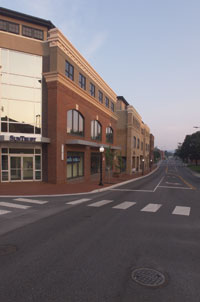 Kent Square Parking Garage
Kent Square Parking Garage
|
|
|
This summer, for instance, the town completed the first phase of its long-range plans for downtown improvement, installing new brick sidewalks, benches, and trees on Main Street between Roanoke Street and College Avenue to freshen the familiar landscape and enhance pedestrian safety. Concurrently, some new structures have taken shape along Main Street, most notably the Kent Square Parking Garage [pictured at right] at the corner of Main and Washington streets.
More than simply a garage--with, incidentally, 350 parking spaces--Kent Square incorporates some 80,000 square feet of retail and office space, already home to such popular businesses as Starbuck's and Ben & Jerry's. "A prime example of smart growth is Kent Square," Lancaster notes, "where what would amount to several blocks' worth of development has been consolidated into one block, reducing sprawl."
The smart-growth principle is also evident in the new luxury condominiums developed by Steve Hill and under construction at the corner of Main and Clay streets. A horseshoe-shaped structure situated on just under one acre, Clay Court is nearing completion of its first phase, which will feature 16 modular condos, 52 parking spaces, and 9,000 square feet of retail and commercial space. Hill reports that the first commercial occupants will be an upscale clothing retailer, which he declines to name, and Gourmet Pantry, a specialty food and kitchen store now located on North Main.
Not surprisingly, the condos' prime location generated much interest, especially among Tech alumni desiring a place to stay during jaunts to Blacksburg. Rumor has it that every one of Hill's units was either sold or rented before construction had even begun, which speaks volumes about the popularity of both downtown and Hokie sports. Among what some have begun to call a "new breed of homeowner" is Tom Hyman (political science '73) of Richmond, Va., who purchased a Clay Court unit primarily for those trips to Blacksburg throughout the football and basketball seasons.
And so it grows down on Main Street.
SHIFTING DEMOGRAPHICS, FANTASTIC PROSPECTS
Consider this: The U.S. Census Bureau's 2003 estimated population of Roanoke County (251 square miles) was 87,329; in comparison, the estimated population of Montgomery County (388 square miles) was 85,614--with Blacksburg (at 19.4 square miles) claiming some 40,000 of the share. Perhaps these figures shed a different light on perceptions that Roanoke is Southwest Virginia's only star city.
In addition, Blacksburg, along with Christiansburg and Radford and including Giles, Montgomery, and Pulaski counties, is now considered a Metropolitan Statistical Area by the Census Bureau. The designation isn't so much an indication of booming growth as it is a gateway to federal funding for all sorts of programs that could generally enhance the area's well-being.
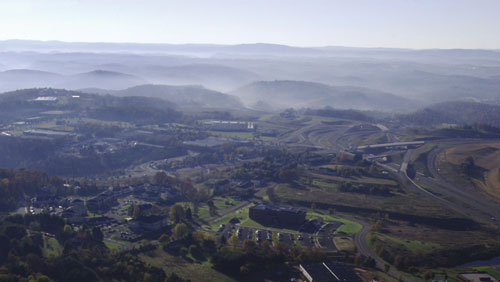 Ellett Valley Ellett Valley
Meanwhile, with Virginia Tech bringing in some 25,000 students annually and more than 6,500 faculty and staff members, Blacksburg's demographics have continued to shift, slowly but surely. Because of the town's high quality of life, accessible health care, advanced public care services, and award-winning public transportation, retirees across the country have been drawn to Blacksburg for decades now. Recent years, however, have seen an influx of younger, middle-aged residents, including a fair share of Tech alumni, some of whom migrate back to the area temporarily.
One such example is Will Cutler (marketing '81) of the Richmond, Va., area, who built a home by Blacksburg Country Club's golf course. Cutler, his wife, and two young boys spend three weekends in the spring, three weeks in the summer, and every home football game weekend in their second home. "It's perfect for Hokie sports events and functions," Cutler says, "and it was a better investment than stocks." And it'll be a fantastic spot to retire when the time arrives.
For folks who want to live and work in the area full time, the opportunities are ever-expanding, making Blacksburg a desirable destination for all sorts of professionals, including those who want to own their own business. "You'd be surprised how many people want to move back here and do business," says Jim Flowers, director of VT KnowledgeWorks, the high-tech business incubator at Virginia Tech's Corporate Research Center (CRC), where more than 100 technology-based companies are housed.
Surprised? Not in the least, especially considering that "the continuing growth of the Blacksburg Industrial Park, the emergence of the CRC, and the creation of the Edward Via Virginia College of Osteopathic Medicine [located in the CRC] are positive changes that further contribute to the area’s high-tech and professional environment," notes Hedgepeth.
Blacksburg's ambiance and opportunities almost certainly make life easier for CRC President Joe Meredith (aerospace engineering '69; Ph.D. industrial and systems engineering '97). When pitching the area to potential entrepreneurs and employees, Meredith gives the town, the university, and the center itself equal billing. "We try to explain that Blacksburg is the best of all possible locations: great university assistance for new-product development; a great secondary school system; great social, athletic, and recreational opportunities for the family; and great business collaboration opportunities at the CRC--all without the cost of living, traffic, risks, and complexities of a major metropolitan area."
|
|
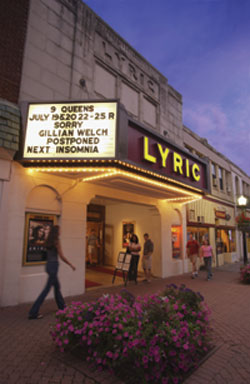 The Lyric Theatre is celebrating its 75th
The Lyric Theatre is celebrating its 75th
anniversary this year.
|
THE ACCOLADES KEEP COMING
Those banners hanging on lampposts throughout the town are right: Blacksburg is special.
Even though the moderate weather and relatively low humidity are mere happenstance of Blacksburg's location in the New River Valley, most everything else about this handsome town has been carefully planned and crafted--and to impressive results. Fittingly, Blacksburg's top-rate services, technological savvy, competitive cost of living, low taxes, safety, manageable traffic, diverse cultural attractions and leisure pursuits, economic opportunities, and urban amenities have consistently earned the town its share of recognition, both statewide and nationwide.
In the early 1990s, Blacksburg was ranked first in Virginia and 20th in the country by Retirement Places Rated. Since 2000, the town has been named a top 20 retirement locale by
Blue Ridge Country Magazine
and the eighth best place to live in the nation and the very best in the mid-Atlantic by Men's Journal magazine. Cited in
50 Best Small Southern Towns and in Outside Magazine as a top 10 "dream town" for outdoor enthusiasts, Blacksburg was also ranked 61st out of 375 as a "best sports city" in
The Sporting News. In part because of its proximity to the New River and the Appalachian Trail, along with its "low, low home prices"--the town’s median home price is approximately $150,000--Blacksburg was this year again named a top 50 place to live by Men's Journal.
Among last year's achievements, Blacksburg was ranked second in the country by the
Digital Cities survey and was the recipient of the U. S. Senate Productivity and Quality Award for Virginia, as well as the 3CMA Savvy Award and the Grace Hopper Technology Leadership Award for
Blacksburg Alert, the town's innovative service to improve communication among government agencies, organizations, and the general public. Once registered for Blacksburg Alert, citizens receive, via telephone, e-mail, or fax, emergency notifications and service-related information, such as road closings and inclement weather announcements.
This past July, the Blacksburg/Christiansburg/Radford area was cited in Expansion Management magazine's "Knowledge Worker Quotient," which identifies "metro areas that are exceptionally well placed to attract and nurture high-tech companies and entrepreneurs because of their concentration of extremely well-educated workers." The area placed second in the category of "Top Metros for Ph.D.s Per Capita" (following only Ithaca, N.Y.) and 14th in the category of "Best Educated Technical Work Force" and was also included on the list of "Five-Star Knowledge Worker Metros." Having a top-notch research university in one’s backyard definitely has its benefits.
And in a development that illustrates Blacksburg's commitment to sustaining its reputation as one of the most wired communities on the planet, the communication company Flarion will offer residents a mobile broadband service for a $40 monthly fee. In essence, the entire town will be a "hotspot," which means that laptop users with the mobile connection will be able to access the Internet from anywhere in town.
TOWN, GOWN, AND BEYOND
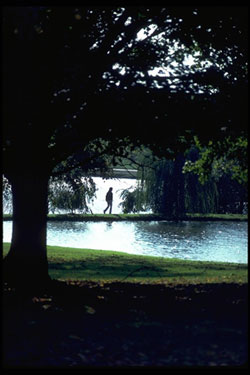 The Duck Pond is a favorite
The Duck Pond is a favorite
campus destination.
|
By the looks of things, Blacksburg's rock-solid reputation is not going to crumble anytime soon, despite the town's growing population and popularity. "One of the critical issues facing Blacksburg is meeting the needs of more citizens without sacrificing the quality of life already present," Lancaster says. "Much of our Comprehensive Plan is designed to preserve that quality of life. We want to expand our parks, preserve our open space [some 40 percent of the land in Blacksburg is undeveloped], provide the latest in technology, expand commercial and cultural opportunities, and promote diversity."
In good part, those aspirations undeniably depend on cooperation and collaboration between the town and the university. "Blacksburg and Virginia Tech can both contribute to the preservation of the quality of life here through smart growth," notes Lancaster, who, besides his role in town government, is a broadcast media coordinator and producer for the university. "Tech, too, is looking at smart-growth ideas to grow in and up, rather than out."
One imminent project on the university's horizon that is of keen interest to the town is the completion of the remaining initiative in the Arts Blueprint for Virginia Tech--the construction of a performing arts center. Although the final location is still undetermined, the Blacksburg Town Council recently passed a resolution urging the university to seriously consider a downtown site. "We are examining areas of cooperation," says Lancaster. "For example, the town is planning on extensive improvements to the area near the mall entrance to Tech, in anticipation of the university's construction of a performing arts facility there."
Bolstered by such cooperation and collaboration, Blacksburg does indeed stand in good stead.
Visit the Town of Blacksburg online at http://www.blacksburg.gov/ and the Blacksburg Electronic Village at http://www.bev.net/.
Hanging around Blacksburg
Ask Tech alumni about their favorite Blacksburg hangouts and you'll get an answer in no time flat. Consider their answers collectively and you'll get a mini-history of the town--with a distinctly Hokie slant.
Back when times were simpler and Tech was known as VPI, two College Avenue favorites were the corner Rexall drugstore--with soda fountain, of course--and Meredith's Diner, whose owner, Ralph Meredith, became manager of Tech's dining hall when the diner was leveled for campus expansion. "Meredith's was a streetcar with a lean-to built on the back," recalls Guy Kiracofe '58. "The building wasn't too classy, but the food and service were good, and Ralph was a good host who knew his regular customers."
We suspect, however, that the cadets' real adventures were had at The Bloody Bucket, variously described as a combination skating rink and bar/restaurant and a beer joint with snacks. Just east of campus on Rt. 460, "it was located more than the one-mile limit set for the cadets to wander off without a pass," remembers Olimpio Martinez '47. Despite the restrictions, "Most of the students would gather there after football games to celebrate, even if Tech had lost. It was also a good place to unwind after exams," says James Del Papa '52. Exactly what went on at the place with the unsavory name remains to be told, but some things are best left to the imagination.
The 1960s ushered in an array of changes across the nation, but in Blacksburg, the Fighting Gobblers still reigned supreme as evidenced by the popularity of the Golden Gobbler, a "great place to kick back and have a few beers and a pizza after a grueling week of classes," according to Bill Wingate '68.
Most alumni from the 1970s fondly remember "the Greek's" or the Greek's Cellar (The Cellar Restaurant). "There was a nice restaurant upstairs, but we always went to the basement to have some beer or wine and talk about the topics of the day, mostly the Vietnam War," says Pam Fromberg '72. True to the spirit of the decade, some unconventional instruction apparently occurred down in that basement. "In a number of ways, I received just as good an education there as I did in class," claims John Crenshaw '75. "The Greek's was a watering hole for professors, and in its relaxed, informal, and friendly environment, such professors as Bill Mackie and Dean O'Donnell dispensed knowledge and wisdom far and above that of the lecture hall."
The range of favorite hangouts during the 1970s seems to reflect the changing face of Tech's student body. For instance, Donald Graber '75 remembers Cecil's Place, a "hillbilly bar" where "every evening, the pool table in the back was turned over during a dispute." Dave's Hotdogs was, according to Elaine Griffin '77, "THE place to watch Monday Night Football." And noting that "disco was hot," Barry Wells '79 says that After Sundown was one of his favorite places. But receiving the most mentions from the alumni of the 1970s was 117 South Main Street (now Cabo Fish Taco) for its live music--"a rockin' joint," proclaims Andrew Selsky '78.
Graduates from the 1980s were drawn to The Fat Rabbit, Gillie's (then an ice cream place; now a vegetarian restaurant), Souvlakis, and Carol Lee's Doughnuts, which Laurie Spangler '82 discovered had moved from College Avenue to North Main Street. "With my doughnut consumption," Spangler quips, "they could have retired early, but they certainly could not have gone out of business." But the hottest of hot spots was Mr. Fooz, insists William Burden '84. "Good food, cheap beer, band, and darts. What more did you need?"
Not surprisingly, the graduates from the 1990s had the most to share about their old stomping grounds. "For a town so small," says Mary Jean Corriss '97, "there were lots of fun places to go," among them, Ton-80, Mike's Grill ("absolutely the best burgers anywhere," according to Todd Becker '95), Sharkey's, Arnold's, the Rivermill, and Bollo's, all of which received multiple mentions.
The most popular hot spots during the 1990s, however, seem to have been Hokie House and Top of the Stairs. At Hokie House, Corriss remembers, "you knew the jukebox would play songs from Grease at some point during the night, which was annoying at first, but then became familiar and expected. Plus, you couldn't beat the views of downtown Blacksburg from the second-story windows."
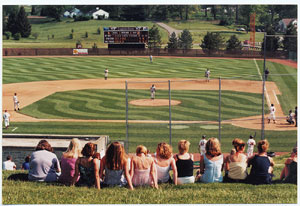 English Field
English Field
|
And lest the younger alumni are accused of seemingly never getting outdoors, a few mentioned the Tech campus itself.
"My favorite hangout was the Duck Pond," says Mary Kitson '93. "At any time of day, it's the perfect place to get away for a walk, to study, or to relax with friends."
Similarly, Amy Podraza '97 admitted to loving the path from the Duck Pond along the golf course to Oak Lane Community: "I would often gladly skip the bus just to walk the path to campus and enjoy the peace, quiet, and beauty."
And at least one Hokie found her solace at the diamond--when Sara Fawley Diep '01 needed a break, she went to English Field. "I'd take homework or reading for in-between the innings," Diep says. "I love all kinds of baseball, but there's nothing as relaxing as college baseball. I think I liked practice in the cold more than the games. It was so much fun to watch without a crowd and just hear the sounds of the game."
|